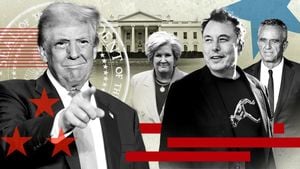U.S. politics took yet another dramatic turn this week as Senator Tom Cotton threatened military action against the International Criminal Court (ICC), which has issued arrest warrants for Israeli Prime Minister Benjamin Netanyahu and former Defense Minister Yoav Gallant. These warrants stem from grave accusations of war crimes linked to Israel’s military campaign against Gaza, significantly heightening tensions between the United States and the ICC.
Following the ICC's issuance of these warrants, which cite crimes against humanity and violations of war laws, Cotton's reaction was swiftly described as inflammatory. His position rests on the controversial U.S. law known as the "Hague invasion act", formally titled the American Service-Members' Protection Act. This law, passed back in 2002, is intended to protect U.S. military personnel from possible prosecution by the ICC.
Senator Cotton's outrage was apparent when he declared on X (formerly Twitter), "The ICC is a kangaroo court, and Karim Khan is a deranged fanatic. Woe to him and anyone who tries to enforce these outlaw warrants." He made it clear he believes any enforcement of these warrants against Israeli officials could warrant military action, stating, "Let me give them all a friendly reminder: the American law on the ICC is known as the Hague invasion Act for a reason. Think about it."
While Cotton's comments stirred controversy domestically, reactions from other U.S. officials also revealed deep divisions. President Joe Biden condemned the ICC's actions as "outrageous", underlining solidarity with Israel, and asserting there is no moral equivalence between Israel and Hamas. Meanwhile, Cotton’s fellow Republican, Lindsey Graham, took the rhetoric up another notch, threatening economic repercussions against U.S. allies who might seek to enforce the arrest warrants.
Graham went as far as to say, "If you are going to help the ICC as a nation and force the arrest warrant against Bibi and Gallant...") he then made the alarming pledge of sanctions against nations aiding the ICC, deeming such actions as directly threatening Israel’s statehood.
He even went on to suggest, "We’re gonna crush your economy" if any allied country supports the ICC’s course of action against Israel.
The ICC's issuance of arrest warrants came during unyielding military operations by Israeli forces, which have resulted in significant civilian casualties and extensive destruction throughout Gaza. The court contended there were reasonable grounds to assess the existence of war crimes, with reports indicating over 44,000 Palestinians dead since the beginning of this current conflict, and widespread condemnation from international human rights organizations. The circumstances surrounding the accusations of war crimes relate to the alleged use of starvation as warfare, among other serious violations.
Globally, reactions were mixed, with some allied nations backing the ICC’s decision. For example, significant countries like France, Canada, and the UK indicated they would need to arrest Netanyahu should he set foot on their soil, complying with international obligations. British Lawmaker Emily Thornberry asserted, "If Netanyahu enters Britain, we are bound by the Rome Statute to act on the ICC’s warrant."
Despite the discord, political analysts suggest Cotton and Graham's rhetoric might be more about appeasing domestic political factions, rather than concrete foreign policy. Their approach has attracted both support and criticism, reflecting the polarized climate of U.S. politics today over Israel-Palestine relations and accountability for war crimes.
Meanwhile, as the international political circus continues, the humanitarian crisis deepens for those caught up in the unrest. Gaza, now undergoing what many describe as severe famine conditions due to the military blockade, has also seen countless civilians displaced. This dire situation is proving to be increasingly intolerable for many NGOs and humanitarian groups who are persistently calling for intervention and aid.
What remains clear is the multifaceted crisis — with conflicts over accountability and political maneuverings playing out on both domestic and international stages, the path forward seems increasingly fraught with danger. If nothing else, these current events indicate just how precariously issues of international justice can become entangled with the broader geopolitical landscapes.
Can the ICC uphold its mandates under such pressure, and will U.S. lawmakers back down from their combative stances, or will they bolster their resolve against perceived threats to Israel? Only time will tell.



